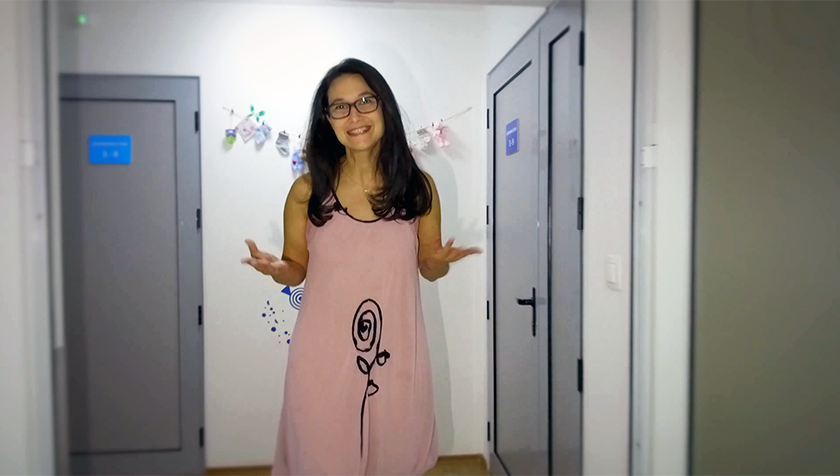
Natural childbirth at Dr. Shterev Hospital
Refer to Dr. Shterev Hospital at least a month before the delivery to give your attending gynecologist and his team to get acquainted with your condition, the progress of your pregnancy and to help you with the necessary documentation.
Natural childbirth goes through three stages. The active period is led by two gynecologists and a team of midwives, anesthesiologist, and neonatologist. The hospital stay for natural delivery is 72 hours.
“Well monitored pregnancy leads to easy delivery”, Dr. Marian Aleksandrov, Head of Maternity wards at Dr. Shterev Hospital.
Natural childbirth at Dr. Shterev Hospital
The pregnancy is a period that lasts 40 gestation weeks. That equals to 10 moon months or around 280 days. During this period the mother is caring for her child who is developing and preparing its first breath outside of the mother’s womb. When the moment of the birth or the so-called estimated delivery date come, the patient is directed for several examinations and tests that complete the entire picture for her condition during the pregnancy monitoring.
What examinations and tests does the pregnant woman do in preparation for delivery?
- Gynecological examination – with it the attending gynecologist observes the level of cervical enlargement;
- Ultrasound Diagnosis (USD) - this examination defines the parameters of the fetus and its predilection, i.e., his position in the mother's womb;
- Measuring the baby's heart tones;
- Several laboratory tests, including complete blood count, biochemistry (glucose, urea, creatinine, total protein, bilirubin, aspirin, ALAT), hemostasis (bleeding time, prothrombin time, aPTT, fibrinogen), chronic infections (AIDS, Hepatitis B, and C), vaginal secretion microbiology;
- Consultation with an anesthesiologist and an internist/cardiologist.
If the future mother monitors her pregnancy at another hospital and wishes to deliver in Dr. Shterev Hospital, it is advisable to refer to a gynecologist at the hospital at least a month before the term. This way her new doctor may get acquainted with the medical records from the previous pregnancy monitoring will receive additional data on the health of the pregnant woman and will do the necessary ultrasound examination to get acquainted with her status and the condition of the baby. Thus, the gynecologist and the medical team that will participate in the delivery will be fully prepared for its course.
Meet our gynecologists’ team and choose a specialist for monitoring your pregnancy and delivery.
What documents are needed for delivery?
Future mothers who want to deliver at Dr. Shterev Hospital later during their pregnancy has to provide the following documentation:
- Exchange card from the female counseling, which contains all the medical records from the beginning of her pregnancy until her first visit to the Dr. Shterev Hospital;
- Hospitalization Direction (Forms of the Ministry of Health and NHIF No. 7) - when the woman has a continuous contribution to the public health insurance and the birth will be on a clinical path;
- An outpatient card for issuing hospital papers required for the period before and immediately after birth.
These documents are provided at the first visit by the future mother. Pregnant women who follow their pregnancy at the Dr. Shterev Hospital from the outset do not need to provide any additional papers as the hospital's administrative team prepares them.
What does the delivery consultation include?
A month before the predicted delivery date the future mother goes through a consultation with an anesthesiologist and an internist/cardiologist. Just before this consultation, she fulfills a documentation pack that is needed for a natural delivery at Dr. Shterev Hospital. The package includes:
- Informed consent protocol for performing small obstetric operations during natural childbirth - the document contains the mother's data and a description of the small obstetric operations;
- A protocol for an anesthesiology consultation that includes the mother's data, past and current disease questionnaire, informed consent for regional or general anesthesia surgery, initial screening, a statement of informed consent for transfusion of blood and blood components.
When do you have to go to the hospital?
Natural birth usually begins with the burrowing of the amniotic sac. It is a must to come to the hospital when “water leak” and it doesn’t matter if contractions, or not accompany this process. The pregnant women may contact her attending doctor before coming to the hospital, or come directly for examination and assess her condition.
Birth may also begin with the occurrence of regular uterine contractions. Usually, they are at every 4-5 minutes, painful and lasting about 30-60 seconds. These contractions differ from the so-called Braxton-Hicks pregnancy contractions, which are not within a specified interval, are not painful, and can occur days or even weeks before the birth itself occurs.
There are two signs of childbirth. They can occur both together, and alone. In either case, the pregnant woman should call for medical attention and at the discretion of the attending gynecologist – to attend the maternity ward for monitoring.
With her arrival in the hospital, the future mother stays in a prenatal room where she is prepared for the upcoming delivery and is monitored by a midwife until full disclosure is obtained. The NST and uterine contractions are continuously monitored during this period by the use of modern cardiothoracic equipment.
Prepare for the upcoming birth with a visit to the School for Future Parents "We create joy"! Learn more about the initiative here and book your participation on 02/9200901! (link to the School for Future Parents).
What should you bring with you to the hospital for a natural delivery?
Besides her ID –card, the pregnant women should have with herself the document for hospitalization, if she had not provided such during the last month of her pregnancy.
All the supplies needed by the woman for her stay at the hospital are provided by the Dr. Shterev Hospital so that in this crucial moment the patients may focus on the most important - the emergence of the new life. They receive personal toiletries, nightgown, bed linen and towels, disposable slippers, ladies' dressings for nursing mothers and breastfeeding pads. All mentioned is included in the price, which is paid for a natural birth at Dr. Shterev Hospital. Meet our official price list here!
Every woman can bring what she thinks she needs and does not fit into the list of supplies provided by the hospital.
How goes the birth process?
The active period of the delivery is led by two gynecologists (leading one and a second attending, who is prepared to join if necessary). They work with a team of midwives, anesthesiologist and pediatric neonatologist. After the birth, the woman remains under ongoing intensive care for two hours. After that, she is transferred to the Maternity Ward together with her baby. The minimum hospital stay for mothers who have given birth naturally is 72 hours (3 days).
First stage
During the first stage, the contractions and the gradual discovery of the cervix begin. In terms of duration, this stage of the delivery is the longest one and lasts from the beginning of the actual delivery with an extension of 2-3 cm to a full cervical extension up to 10 cm. During this stage, the attending gynecologist defines the extent of the enlargement, the position of the cervix, the condition of the bladder and the position of the baby's head. Contractions gradually increase, and the so-called stopper of the cervix falls if this has not happened so far. Your doctor observes the frequency of uterine contractions, the strength, and frequency of children tones that are an essential indicator for the baby well-being. For this purpose, a cardiotocograph is used. This is a special device that records the heart rate, strength, and duration of contractions. If necessary, further examinations are required.
If this is the first birth for the women, this stage lasts about 12-14 hours or longer. It usually is shorter when it is second or subsequent delivery.
Second stage
This is the active delivery stage. It starts with the moment of full cervical discovery and ends with the birth of the baby. This stage may last a few minutes to 2-3 hours. It is led by two gynecologists, a team of midwives, an anesthesiologist and a pediatric neonatologist. The pregnant woman lays on a maternity bed in the delivery room, and she is pushing at every contraction. The medical team continues to monitor the condition of the baby and his tones.
When the baby is born, it is cleaned, and the umbilical cord is cut. Dr. Shterev Hospital adheres to the rule that the newborn should be in direct contact with the mother unless there are medical indications to the contrary.
Third stage
The third stage is the time between the delivery and the “birth” of the placenta and the amniotic pelvis. The time for placental discharge is about 5-10 minutes; the process is not painful and becomes spontaneous or with minimal help from the gynecologist. The woman is then examined for possible tears to be treated. For the next few hours, the woman is monitored to early detection of potential complications and then goes into a maternity ward with her baby.
Take a virtual look of Dr. Shterev Maternity ward!
Anesthesia and birth
Pain during natural childbirth is different for each woman, but it generally feels like pushing and defecation and goes with an inability to determine its exact location. The solution for anesthesia depends on the will of the women and is discussed with her gynecologist who is responsible for the birth and, in critical conditions, by the anesthetist. The choice of the anesthesia depends on the stage of delivery, the characteristics and the strength of the uterine contractions, the cervical and fetal condition, the possible pathological abnormalities in the pregnancy, and the general health of the mother.
Epidural anesthesia is used when the delivery has already begun, and the uterine contractions are regular and strong, the uterine cervix is smoothed, and the discovery is at least 4-5 cm. Epidural anesthesia does not reduce uterine contractions, and it only neutralizes the pain, it is placed through a catheter in the spine.
Join the Open Doors Day to take a look at our Maternity ward - call 02/9200901 and sign up for a useful initiative!
Postpartum recovery and hospital care for the newborn
The minimum stay in the hospital after a natural delivery is 72 hours. During this time the mother is actively monitored to prevent infections, to monitor her recovery and to ensure proper breastfeeding.
Every day she is examined by her gynecologist, who checks the condition of the uterus, the seams if there are any. The doctor follows the onset of lactation to ensure normal breastfeeding. Some indicators are measured, including temperature and pulse. The detachment and condition of the loci are monitored for the prevention of secondary infections.
Sign for a lecture for breastfeeding on 02/920 0901 and get ready for your first meeting with your baby!
Hospital care for the newborn
The first care for the newborn begins from the moment of its appearance when a midwife and a neonatologist take it, the umbilical cord is clamped, and the baby makes its first cleaning as a newborn. In the next days of its stay in the "Dr. Shterev" Hospital, the general condition, the growth and the weight of the newborn are monitored every day. It goes through compulsory vaccinations on an immunization calendar:
- After 24 hours – against Hepatitis B;
- After 48 hours - against tuberculosis;
- After 72 hours blood is screened for of congenital diseases (phenylketonuria, hypothyroidism).
If desired, the mother may refuse to vaccinate her baby by signing a declaration.
During her hospital stay, the women get 24 hours of support and help by the midwives with the first care for the newborn. Our team teaches the new mother how to treat the bellbottom of the baby, how to breastfeed it and how to do its everyday cleaning. Dr. Shterev Hospital provides everything necessary for the baby during the first days after birth.
The hospital discharge of the women and the baby is after the end of the 3-days after the postpartum recovery in the Discharge Room of the hospital.
Pregnancy and birth are an essential part of a woman's life. Meet your adherents in this exciting adventure in the face of obstetricians, midwives, anesthesiologists and the whole team of Dr. Shterev Hospital!
Make an appointment with your doctor on 02/920 0901! Follow our public channel at Viber to make your access to professionals comfortable and convenient! Write a personal message to our official Facebook page to learn your gynecologist schedule or sign for your baby's tune-up!
Video: A tour in our Maternity Ward
We have prepared an exciting video tour in our Maternity Ward for those of you, who cannot book a place for our Open Doors Dat in Dr. Shterev Hospital. Our guide is the charming Evelina Pavlova. Watch the video with a sound on and see all the essential steps, which passes every mother and baby in our Maternity Ward.
P.S. You will also see the special place for daddies.
Video: Maternity Ward
Childbirth is a sacrament, a miracle, a mission! This is how the Ob/Gyn specialists in Dr. Shterev Hospital see it. Watch our exclusive video to know what is the feeling to take the new lie in your hands and to hear the cry of a newly born baby.
Natural childbirth at Dr. Shterev Hospital - resume
The pregnancy lasts around 280 days, but the real change in future mother’s life starts at the moment when her child is born. At Dr. Shterev Hospital we know how crucial this step in the new life is and have dedicated our modernly equipped and cozy maternity ward. After accurate pregnancy monitoring, each woman does final examinations, and on the day of birth, she is surrounded by a team of medical specialists who take her on the way to the most important meeting in life. Natural delivery goes through three stages during which the woman is guided and supported by a team of two gynecologists, two midwives, an anesthesiologist, and a neonatologist. The postpartum hospital stay lasts 72 hours. During this period the mother and the baby receive care and peace to begin to give each other mutual love.
 Медицински комплекс „Д-р Щерев”
Медицински комплекс „Д-р Щерев” 
